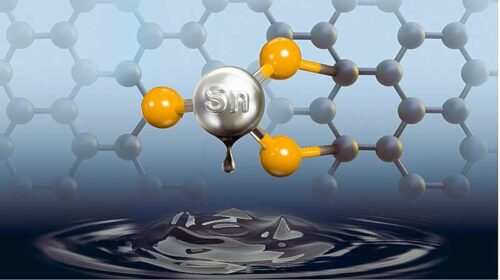This innovation promises to transform the reduction of carbon dioxide (CO2) into valuable multi-carbon products, with 80% selectivity in converting CO2 to ethanol (CH3CH2OH).

A team of researchers from the Chinese Academy of Sciences, City University of Hong Kong, and various other Chinese institutes have unveiled a Cu-free electrochemical catalyst to reduce carbon dioxide (CO2) into valuable multi-carbon products. This achievement holds significant promise for producing essential chemicals across diverse applications. The study, published in Nature Energy, introduces a Tin (Sn)-based catalyst demonstrating an impressive 80% selectivity in reducing CO2 to ethanol (CH3CH2OH).
Professor Bin Liu, a co-author of the paper, emphasised that the discovery of C-C coupling over the Sn1-O3G catalyst resulted from deliberate efforts, building upon prior research into the CO2 reduction behaviour of transition metal single-atom catalysts. The researchers conducted comprehensive preliminary experiments, assessing various Sn-based CO2 reduction catalysts, including metallic Sn nanoparticles, SnS2 nanosheets, SnS2 on nitrogen-doped graphene, single Sn atoms on nitrogen-doped graphene (Sn-4N), and single Sn atoms on O-rich graphene (Sn1-O3G).
These experiments showed that Sn1-4N and Sn1-O3G catalysts could reduce CO2 to CO when coupled with KHCO3 as a proton donor in a CO2RR solution. However, only the Sn1-O3G catalyst succeeded in producing ethanol when exposed to the acid formate. The researchers explain that this distinction was likely due to the differing coordination environments of Sn, prompting the researchers to concentrate their efforts on understanding the C-C coupling mechanism on O-coordinated Sn catalytic sites and constructing a tandem catalyst for selective CO2RR to ethanol.
The team fabricated their innovative Sn-based electrocatalyst through a solvothermal reaction between SnBr2 and thiourea on a three-dimensional (3D) carbon foam, subsequently examining its structural composition. Their findings revealed that the catalyst comprised SnS2 nanosheets and atomically dispersed Sn atoms, coordinated on the 3D O-rich carbon through binding with three O atoms (Sn1-O3G).
Regarding the electrochemical performance, the researchers stated that the SnS2/Sn1-O3G catalyst consistently produced ethanol with a Faradaic efficiency (FE) of up to 82.5% at -0.9 VRHE and a geometric current density of 17.8 mA cm–2. Moreover, the FE for ethanol production remained above 70% within the potential window from -0.6 to -1.1 VRHE.
This catalyst demonstrated exceptional promise, effectively converting CO2 into ethanol with high selectivity and retaining 97% of its initial activity after 100 hours of operation. The team explained that the dual active centres of Sn and O atoms in Sn1-O3G facilitated the adsorption of various C-based intermediates, reducing the C-C coupling energy between *CO(OH) and *CHO and enabling a formyl-bicarbonate coupling pathway. Looking ahead, this Cu-free catalyst paves the way for efficient C-C bond formation and CO2 reduction to ethanol. This approach could revolutionise ethanol production and potentially extend to synthesising other desired chemical products through CO2 reduction. The team explained the importance of further exploration through high-throughput experiments and theoretical calculations to optimise catalytic reactions and deepen our understanding of the process, ultimately opening new avenues for producing various chemicals.






